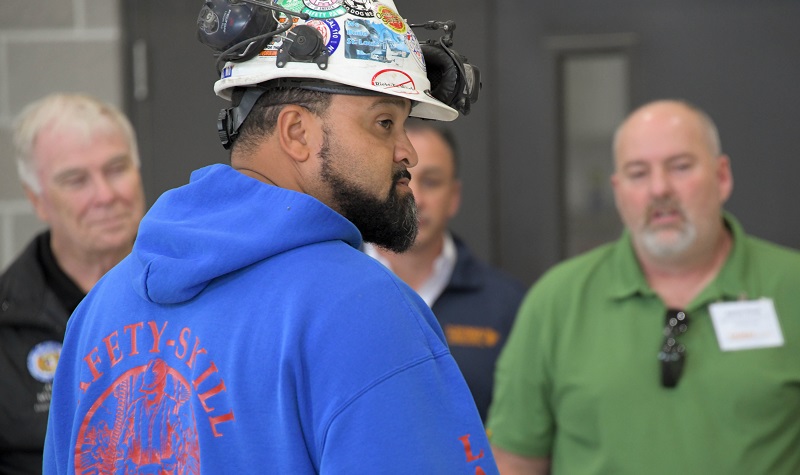With the passage of the historic bipartisan “Infrastructure Investment and Jobs Act” (IIJA) in 2022, there’s a lot of attention on the infrastructure in this country that needs to be updated and repaired. Faced at the same time with nationwide shortages of trade workers, lawmakers are beginning to realize that the need for skilled and well-trained laborers is not a partisan issue. To address this concern, a Town Hall was hosted at the Laborers and Contractors Training Center in Montgomery County, Mo., and the takeaway message was that everyone wins with a highly-trained workforce, one filled with laborers trained by the Laborers’ International Union of North America (LIUNA).
Missouri State Representatives from both parties who comprise the Missouri House Workforce and Infrastructure Development Committee attended the Town Hall. They discovered what makes LIUNA different – the commitment to quality and ongoing training. These lawmakers learned about the “investment we make in workforce development,” said Zack Dunn, Director of Government Affairs for the Missouri-Kansas Laborers District Council. “Apprentices are here for a career, not a short-term job.”
Rep. Louis Riggs, Chair of the House Committee, pointed out, as much attention needs to be paid to the people that make infrastructure happen in the first place. “That’s what it comes down to,” he said. “How can LIUNA and the government be more effective resource partners to help identify career paths and help people get the real-life training you offer?”
The group of bipartisan legislators was treated to presentations by Director Scott Hughes, Mike Howard, Recruitment and Outreach Specialist, and Dan Grass, President of Heitkamp Masonry, and were given a chance to engage in Q&A. Afterwards, they finished the day with a tour of the High Hill facility to see what students are learning and find out what recruiting efforts are underway.


Bridget Walsh Moore, a representative from South St. Louis County, cut to the bipartisan mission of the committee by saying, “What’s important to me is that we get Missouri back to work.”
Eight lawmakers from the committee attended the town hall, six of whom are Republicans. As David A. Frye, LIUNA Vice President and Midwest Regional Manager, has stressed, “There are no such things as ‘Republican bridges’ or ‘Democratic roads.’” President Biden’s IIJA is creating and will continue to provide work for thousands of Americans. Combined with a large portion of the workforce nearing retirement and a lack of awareness of the promise inherent in trade work, alarms are going off for legislators who, like Moore, want to make sure their constituents have rewarding, well-paying jobs.
“Training is what keeps LIUNA Laborers and Contractors on the cutting edge of the construction industry,” explained Brandon Flinn, Business Manager of the Missouri and Kansas Laborers District Council. “LIUNA Laborers are continuing to learn and update their skill sets to become more valuable to the construction industry.”
Joshua Wright, Executive Director at the Laborers-Contractors Training Center said, “As a graduate of the apprenticeship program myself, I understand the role training had in formulating my career. Every part of our organization becomes stronger each time our members complete a training course.”
The needs are great, and Missouri has its share of aging infrastructure and one of the largest highway systems in the country. Howard told lawmakers during the town hall the industry is expected to grow at a compounded annual growth rate of about 4.8 percent in the state. Money has already been dedicated to this type of work, so now it’s about finding the right people with the right skills – LIUNA-trained Laborers – to get it done.
Creating awareness through town halls like these can be a critical first step, because the needs are everywhere. Biden’s IIJA has already allocated $2.4 billion in Iowa, $1.4B of which is earmarked for transportation improvements in roads, bridges, and so on. Nebraska has $2.6B announced for transportation investments alone, $2.4B in Oklahoma, and the list goes on, just in the LIUNA Midwest Region alone.
Dan Grass highlighted the skilled workforce as one of the key benefits of LIUNA-trained Laborers. “As a business owner, the last thing I need to be thinking about is training people – these guys (at the training facility) are like a second half of my company,” he said.
Riggs said he is seeking to create opportunities in three different key areas – to eliminate training deserts, to help people educate in place, and to take advantage of existing strategic partnerships. The High Hill training facility, he said, “checks all three boxes.”
“We need to do a better job educating our workforce as to what all the prospects are,” Riggs continued. “The good old days of ‘you need to have a four-year degree to be successful,’ we know that’s a lie. This is the type of facility that we need to make everybody aware of, that there are training opportunities here and begin to partner with people from grade school on up.”
Joshua Wright agrees the opportunities abound. “At the Training Center, we are not just about demolition, solar, and water. We don’t just build bridges, highways, and buildings. We build legacies. We are proud to show it,” said Wright.
America has a tremendous opportunity to strengthen its position in the world, thanks in part to President Biden’s Infrastructure Investment and Jobs Act. The path to the middle class is expanding into an eight-lane highway, and events like this Town Hall are critical to building awareness of the role LIUNA can play in helping people get on that highway. Together with cooperation from contractors and lawmakers – on both sides of the aisle – we can fill those new jobs for capable, professionally-trained people hungry for work.



